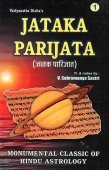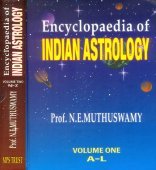Saravali, Sārāvalī: 4 definitions
Introduction:
Saravali means something in Hinduism, Sanskrit. If you want to know the exact meaning, history, etymology or English translation of this term then check out the descriptions on this page. Add your comment or reference to a book if you want to contribute to this summary article.
In Hinduism
Vyakarana (Sanskrit grammar)
Source: Wikisource: A dictionary of Sanskrit grammarSārāvalī (सारावली).—Or सारावली-व्य्याकरण (sārāvalī-vyyākaraṇa) an inindependent treatise on grammar by Naryana Vandyopadhyaya.

Vyakarana (व्याकरण, vyākaraṇa) refers to Sanskrit grammar and represents one of the six additional sciences (vedanga) to be studied along with the Vedas. Vyakarana concerns itself with the rules of Sanskrit grammar and linguistic analysis in order to establish the correct context of words and sentences.
Languages of India and abroad
Sanskrit dictionary
Source: Cologne Digital Sanskrit Dictionaries: Aufrecht Catalogus Catalogorum1) Sārāvalī (सारावली) as mentioned in Aufrecht’s Catalogus Catalogorum:—[anonymous] Rādh. 43.
2) Sārāvalī (सारावली):—[grammatical] Jones. 412.
—a grammar in 7 pāda, by Nārāyaṇa Vandya. Io. 828. The eighth pāda contained a grammar of Prākṛt.
—an elementary grammar by Vādirāja. Oxf. (Saṃskṛt b 31).
3) Sārāvalī (सारावली):—[dharma] Quoted by Raghunandana Oxf. 292^b. See Smṛtisārāvalī.
4) Sārāvalī (सारावली):—[nyāya] Sb. 199.
5) Sārāvalī (सारावली):—jy. Kh. 90. Kāṭm. 11. Rice. 36 (and—[commentary]). Quoted by Bhaṭṭotpala on Bṛhajjātaka (it mentions Varāhamihira), by Viśvanātha Oxf. 338^a, by Raghunandana and Kamalākara, by Śaṅkara in Saṃskāramayūkha, by Nṛhari Burnell. 78^b, in Saṃskārakaustubha.
—by Kalyāṇavarman. L. 337. K. 244. B. 4, 206. Bik. 335. Np. Ix, 46. Bp. 273. Quoted in Keśava’s Jātakapaddhati Bhr. p. 30.
—by Maṇittha. Oudh. Iii, 14.
—by Varāhamihira (?). Oppert. 1349. 6275. Ii, 3551. 5054. 6617.
—by Śrīpati. B. 4, 206.
6) Sārāvalī (सारावली):—med. Burnell. 69^a.
7) Sārāvalī (सारावली):—[tantric] Quoted in Śāktānandataraṅgiṇī Oxf. 104^b.
8) Sārāvalī (सारावली):—Kumārasambhavaṭīkā by Gopālānanda Vāṇīvilāsa.
9) Sārāvalī (सारावली):—[dharma] Quoted by Aparārka on 3, 2.
10) Sārāvalī (सारावली):—jy. Quoted by Hemādri in Pariśeṣakhaṇḍa 2, 789. 791.
—by Kalyāṇavarman. Io. 1014. 2508. Stein 175. He quotes Kanakācārya, Devakīrtirāja, Mandila. See Sudhākara in Gaṇakataraṅgiṇī, Pandit Xiv, 17.
11) Sārāvalī (सारावली):—med. by Śivadāsa. Stein 191 (inc.).
12) Sārāvalī (सारावली):—jy. by Kālyaṇavarman. Ulwar 2000.
13) Sārāvalī (सारावली):—grammar by Nārāyaṇa Vandyopādhyāya. Hpr. 2, 245. C. Kṛdantaṭīkā by Raghuvīra Vandyopādhyāya. Hpr. 2, 39.
14) Sārāvalī (सारावली):—astrol. Peters. 5, 527.
—by Kalyāṇavarman. Bd. 858. L.. 1006 (inc.). Peters. 5, 528.
Sārāvalī (सारावली):—[from sāra] f. Name of various works.
[Sanskrit to German]
Sanskrit, also spelled संस्कृतम् (saṃskṛtam), is an ancient language of India commonly seen as the grandmother of the Indo-European language family (even English!). Closely allied with Prakrit and Pali, Sanskrit is more exhaustive in both grammar and terms and has the most extensive collection of literature in the world, greatly surpassing its sister-languages Greek and Latin.
See also (Relevant definitions)
Starts with: Saravalige, Saravalijataka.
Ends with (+3): Adhikaranasaravali, Ayurvedasaravali, Camucaravali, Chandahsaravali, Chhandahsaravali, Danasaravali, Jatakasaravali, Kesharavali, Koshthisaravali, Laghusaravali, Nirdoshakulasaravali, Nyayasaravali, Prayashcittasaravali, Samhitasaravali, Samketasaravali, Shaivasiddhantasaravali, Shastrasaravali, Siddhantasaravali, Smritisaravali, Snapanasaravali.
Full-text (+13): Saravalijataka, Smritisaravali, Vrittasaravali, Varahamihira, Shaivasiddhantasaravali, Laghusaravali, Siddhantasaravali, Nyayasaravali, Gopalananda vanivilasa, Narayanavandya, Samhitasaravali, Nirdoshakulasaravali, Jvaravali, Kalyanavarman, Narayana vandya, Raghuvira, Jatakasaravali, Ramashamkara, Yogasaravali, Vadiraja.
Relevant text
Search found 4 books and stories containing Saravali, Sārāvalī; (plurals include: Saravalis, Sārāvalīs). You can also click to the full overview containing English textual excerpts. Below are direct links for the most relevant articles:
Significance of the Moon in Ancient Civilizations (by Radhakrishnan. P)
16. Position of Moon in Zodiac Signs and Planetary Aspects < [Chapter 5 - Adoration of the Sun and Moon]
3. Moon in Jyotisha < [Chapter 2 - A Sceintific Outlook on Astrology]
3. Horoscope Chart of Ramakrishnan < [Chapter 14 - Case Studies of Natal Chart]
The validity of Anumana (inference) in Nyaya system (by Babu C. D)
Karmic Astrology—a Study (by Sunita Anant Chavan)
Part 2.1.5 - Concept of Graha (Planet) < [Chapter 2 - Jyotiḥśāstra and the Concept of Karman]
A History of Indian Philosophy Volume 3 (by Surendranath Dasgupta)
Part 4 - Rāmānuja Literature < [Chapter XVIII - An Historical and Literary Survey of the Viśiṣṭādvaita School of Thought]
Related products


